|
Books Should Be Free Loyal Books Free Public Domain Audiobooks & eBook Downloads |
|
|
Books Should Be Free Loyal Books Free Public Domain Audiobooks & eBook Downloads |
|
Science |
|---|
|
Book type:
Sort by:
View by:
|
By: Neltje Blanchan (1865-1918) | |
|---|---|
 Wild Flowers Worth Knowing
Wild Flowers Worth Knowing
| |
 Bird Neighbors
Bird Neighbors
| |
By: Nesta Helen Webster (1876-1960) | |
|---|---|
 Secret Societies And Subversive Movements
Secret Societies And Subversive Movements
| |
By: New York Hospital. Society [Editor] | |
|---|---|
 A Psychiatric Milestone Bloomingdale Hospital Centenary, 1821-1921
A Psychiatric Milestone Bloomingdale Hospital Centenary, 1821-1921
| |
By: New Zealand Committee | |
|---|---|
 Report of the Committee of Inquiry into the Various Aspects of the Problem of Abortion in New Zealand
Report of the Committee of Inquiry into the Various Aspects of the Problem of Abortion in New Zealand
| |
By: New Zealand. Committee of Inquiry into Mental Defectives and Sexual Offenders | |
|---|---|
 Mental Defectives and Sexual Offenders Report of the Committee of Inquiry Appointed by the Hon. Sir Maui Pomare, K.B.E., C.M.G., Minister of Health
Mental Defectives and Sexual Offenders Report of the Committee of Inquiry Appointed by the Hon. Sir Maui Pomare, K.B.E., C.M.G., Minister of Health
| |
By: New Zealand. Committee of the Board of Health | |
|---|---|
 Venereal Diseases in New Zealand (1922) Report of the Special Committee of the Board of Health appointed by the Hon. Minister of Health
Venereal Diseases in New Zealand (1922) Report of the Special Committee of the Board of Health appointed by the Hon. Minister of Health
| |
By: New Zealand. Special Committee on Moral Delinquency in Children and Adolescents | |
|---|---|
 Report of the Special Committee on Moral Delinquency in Children and Adolescents
Report of the Special Committee on Moral Delinquency in Children and Adolescents
| |
By: Niccolò Machiavelli (1469-1527) | |
|---|---|
 Machiavelli, Volume I
Machiavelli, Volume I
| |
By: Nicolas-Joseph Thiéry de Menonville (1739-1780) | |
|---|---|
 Travels to Oaxaca
Travels to Oaxaca
Botanical Piracy! A French botanist plots to steal red dye cochineal insects from Spanish Mexico and transplant them and their cacti hosts to the French Caribbean. The year is 1776. Nicolas-Joseph Thiéry de Menonville is a fast talker and a quick thinker. Botanist and physician by training, he insinuates his way from Port-au-Prince, first to Havana and then to the Mexican mainland on the ruse that he is searching for a botanical cure for gout. In Vera Cruz, however, his passport is confiscated, and the Viceroy orders him to leave Mexico on the first available ship... | |
By: Nixon Waterman (1859-1944) | |
|---|---|
 The Girl Wanted
The Girl Wanted
| |
By: Norman Spinrad (1940-) | |
|---|---|
 Subjectivity
Subjectivity
| |
By: Olaudah Equiano (1745-1797) | |
|---|---|
 The Interesting Narrative of the Life of Olaudah Equiano, Or Gustavus Vassa, The African
The Interesting Narrative of the Life of Olaudah Equiano, Or Gustavus Vassa, The African
The Interesting Narrative of the Life of Olaudah Equiano, written in 1789, is the autobiography of Olaudah Equiano. It discusses his time spent in slavery, serving primarily on galleys, documents his attempts at becoming an independent man through his study of the Bible, and his eventual success in gaining his own freedom and in business thereafter. The book contains an interesting discussion of slavery in West Africa and illustrates how the experience differs from the dehumanising slavery of the Americas... | |
By: Olive Schreiner (1855-1920) | |
|---|---|
 Woman and War
Woman and War
Olive Schreiner was a South African writer born in 1855 to missionary parents in the Eastern Cape. She is credited with being the first Internationally famous South African Novelist. She was an extraordinary person and was one of the earliest campaigners for women's rights, including the right to equal pay for equal work, saying: "The fact that for equal work equally well performed by a man and by a woman it is ordained that the woman on the ground of her sex alone shall receive a less recompense is the nearest approach to a willful and unqualified "wrong" in the whole relation of woman to society today"... | |
 Thoughts on South Africa
Thoughts on South Africa
'Thoughts on South Africa' is a collection of Schreiner's observations of colonial South Africa in the early 19th century, mostly regarding Boer-English relations. The book was published posthumously in 1923. Prospective listeners should be aware that it reflects the place, culture and language of the time in which it was written. | |
By: Olive Thorne Miller (1831-1918) | |
|---|---|
 A Bird-Lover in the West
A Bird-Lover in the West
| |
 Little Brothers of the Air
Little Brothers of the Air
| |
 In Nesting Time
In Nesting Time
| |
By: Oliver Herford (1863-1935) | |
|---|---|
 A Child's Primer Of Natural History
A Child's Primer Of Natural History
| |
By: Oliver Lodge (1851-1940) | |
|---|---|
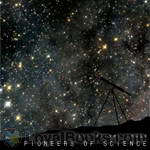 Pioneers of Science
Pioneers of Science
This book takes its origin in a course of lectures on the history and progress of Astronomy arranged for Sir Oliver Lodge in the year 1887. The first part of this book is devoted to the biographies and discoveries of well known astronomers like Copernicus, Brahe, Kepler, Galileo and Newton. In the second part, the biographies take a back seat, while scientific discoveries are discussed more extensively, like the discovery of Asteroids and Neptune, a treatise on the tides and others. | |
By: Oliver T. (Oliver Thomas) Osborne (1862-1940) | |
|---|---|
 Disturbances of the Heart
Disturbances of the Heart
| |
By: Ontario. Ministry of Education | |
|---|---|
 Ontario Teachers' Manuals: Nature Study
Ontario Teachers' Manuals: Nature Study
| |
By: Orestes Augustus Brownson (1803-1876) | |
|---|---|
 The American Republic : constitution, tendencies and destiny
The American Republic : constitution, tendencies and destiny
| |
By: Orin Fowler (1791-1852) | |
|---|---|
 A Disquisition on the Evils of Using Tobacco and the Necessity of Immediate and Entire Reformation
A Disquisition on the Evils of Using Tobacco and the Necessity of Immediate and Entire Reformation
| |
By: Oscar D. Skelton (1878-1941) | |
|---|---|
 Chronicles of Canada Volume 32 - The Railway Builders: A Chronicle of Overland Highways
Chronicles of Canada Volume 32 - The Railway Builders: A Chronicle of Overland Highways
When the pace of railroad construction slackened in 1914, Canada had achieved a remarkable position in the railway world. Only five other countries—the United States, Russia, Germany, India, and, by a small margin, France—possessed a greater mileage; and, relatively to population, none came anywhere near her. This is the story of how Canada became a country stitched together by rail. | |
By: Ossama Othman | |
|---|---|
 Debian GNU/Linux : Guide to Installation and Usage
Debian GNU/Linux : Guide to Installation and Usage
| |
By: Otto Hermann Kahn (1867-1934) | |
|---|---|
 Government Ownership of Railroads, and War Taxation
Government Ownership of Railroads, and War Taxation
| |
By: P. Chalmers (Peter Chalmers) Mitchell (1864-1945) | |
|---|---|
 Thomas Henry Huxley; A Sketch Of His Life And Work
Thomas Henry Huxley; A Sketch Of His Life And Work
| |
By: P. Hampson | |
|---|---|
 The Romance of Mathematics Being the Original Researches of a Lady Professor of GirthamCollege in Polemical Science
The Romance of Mathematics Being the Original Researches of a Lady Professor of GirthamCollege in Polemical Science
| |
By: P. T. Barnum (1810-1891) | |
|---|---|
 Struggles and Triumphs, or Forty Years' of Recollections of P.T. Barnum, written by Himself
Struggles and Triumphs, or Forty Years' of Recollections of P.T. Barnum, written by Himself
The 1873 edition of the autobiography of the founding genius of the "Greatest Show on Earth," P.T. Barnum. It details his life and business struggles up to the year 1872. Not only a showman and a museum operator, but an antislavery politician, Connecticut state legislator, Mayor of Bridgeport, Connecticut, and temperance lecturer, Barnum lays aside some of the gilding to provide his thoughts on his career, economics, how to make money, and other issues of the day. - Summary by DrPGould | |
By: Paolo Mantegazza (1831-1910) | |
|---|---|
 Book of Love
Book of Love
Translated from Italian, it delves into the physiology of love from a scientific standpoint, in beautiful writing. | |
By: Patanjali | |
|---|---|
 The Yoga Sutras of Patanjali
The Yoga Sutras of Patanjali
Yoga sutras by Patanjali is a seminal work in yoga, this book is more about control of mind and the true goal of yoga. The sutras are extremely brief, and the translation in neat English makes it very easy for people to understand the ancient Sanskrit text. It starts with the birth and growth of spiritual man through the control of mind. In all, this is a "all in one" book for yoga philosophy written by the master himself. | |
By: Patrick Fahy | |
|---|---|
 The Mightiest Man
The Mightiest Man
| |
By: Paul Ehrlich (1854-1915) | |
|---|---|
 Histology of the Blood
Histology of the Blood
This is a textbook on the science of blood and bloodwork by (1908) Nobel Prize winner, Dr. Paul Ehrlich. Should appeal to hematologists, phlebotomists, and just plain folks interested in how our bodies work. | |
By: Paul Ernst (1899-1985) | |
|---|---|
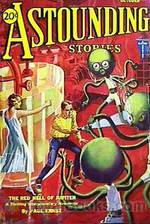 The Red Hell of Jupiter
The Red Hell of Jupiter
| |
 The Planetoid of Peril
The Planetoid of Peril
| |
 The Raid on the Termites
The Raid on the Termites
| |
 The Radiant Shell
The Radiant Shell
| |
By: Paul Lohrman | |
|---|---|
 The Big Tomorrow
The Big Tomorrow
| |
By: Paul Myron Anthony Linebarger (1913-1966) | |
|---|---|
 The Game of Rat and Dragon
The Game of Rat and Dragon
| |
By: Paul W. Fairman (1916-1977) | |
|---|---|
 The Beasts in the Void
The Beasts in the Void
| |
By: Percival Lowell (1855-1916) | |
|---|---|
 Mars and Its Canals
Mars and Its Canals
In the days before telescope photography, astronomers had to draw what they thought they saw through the eyepiece throughout the long dark nights. Sometimes they saw saw more than there really was to see, and a bit over 100 years ago Percival Lowell published books on what he was sure were canals on Mars, signs of intelligent civilization. by Alfred Russel Wallace.) - Summary by ToddHW | |
By: Peter A. (Peter Alexander) Speek (1873-) | |
|---|---|
 A Stake in the Land
A Stake in the Land
| |
By: Peter Baily | |
|---|---|
 Accidental Death
Accidental Death
| |
By: Peter C. Welsh | |
|---|---|
 Woodworking Tools 1600-1900
Woodworking Tools 1600-1900
| |
By: Peter Kropotkin (1842-1921) | |
|---|---|
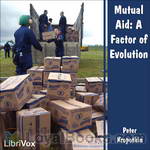 Mutual Aid: A Factor of Evolution
Mutual Aid: A Factor of Evolution
Mutual Aid: A Factor of Evolution is a book by Peter Kropotkin on the subject of mutual aid, written while he was living in exile in England. It was first published by William Heinemann in London in October 1902. The individual chapters had originally been published in 1890-96 as a series of essays in the British monthly literary magazine, Nineteenth Century. Written partly in response to Social Darwinism and in particular to Thomas H. Huxley’s Nineteenth Century essay, The Struggle for Existence, Kropotkin’s book drew on his experiences in scientific expeditions in Siberia to illustrate the phenomenon of cooperation... | |
 The Conquest of bread
The Conquest of bread
In this work, Kropotkin points out what he considers to be the fallacies of the economic systems of feudalism and capitalism, and how he believes they create poverty and scarcity while promoting privilege. He goes on to propose a more decentralised economic system based on mutual aid and voluntary cooperation, asserting that the tendencies for this kind of organisation already exist, both in evolution and in human society. | |
By: Philip José Farmer (1918-2009) | |
|---|---|
 They Twinkled Like Jewels
They Twinkled Like Jewels
| |
By: Philip K. Dick (1928-1982) | |
|---|---|
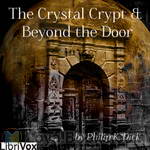 The Crystal Crypt & Beyond the Door
The Crystal Crypt & Beyond the Door
Two early science fiction stories by the wonderful craftsman, Philip K. Dick. In the Crystal Crypt, taken from the 1954 Planet Stories, the war between Mars and Terra is about to erupt and earth has only merchants and salesmen to fight; can they carry out their mission? Beyond the Door is a story that asks and answers the question: what lives beyond the door? And is it dangerous? | |
 The Defenders
The Defenders
The terrible destruction of total nuclear war between the Western and Eastern Blocks has succeeded in sterilizing the surface of the earth. No living creature can now exist there and all humans on both sides, have fled to the hives built miles below the surface where they constantly work to produce the war materials necessary to carry on the battle. For 8 years now, the actual fighting between these super powers has been conducted by robots known as Ledeys since only they can sustain the terrible levels of radiation caused by the constant bombardment... | |
 The Gun
The Gun
| |
 Beyond Lies the Wub & The Skull
Beyond Lies the Wub & The Skull
Two stories in the inimitable Philip Dick style. What is a Wub? A 400 pound slovenly, fat, ungainly, drooling animal that looks like a cross between a walrus and an enormous hog? Well, yes that is pretty much what he looks like and for 50 cents, a good bargain no matter how he tastes. The hungry spaceship crew expect to find out. Of course the Wub may not entirely agree but it doesn't have much to say about it. The second story, The Skull, is a skilful mesh of time travel, unscrupulous governments, prisoners, and religion. With an assassin thrown in for good measure. Enjoy! | |
 The Skull
The Skull
| |
By: Philip W. Bishop | |
|---|---|
 The Beginnings of Cheap Steel
The Beginnings of Cheap Steel
| |
By: Plague Ship (1912-2005) | |
|---|---|
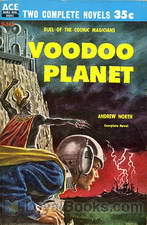 Voodoo Planet
Voodoo Planet
The sequel to Plague Ship, Voodoo Planet finds the Solar Queen banned from trade and starting her supposed quiet two-year stint as an interstellar mail carrier. But instead her crew accepts a visit to the safari planet of Khatka, where they find themselves caught in a battle between the forces of reason and the powers of Khatka’s mind-controlling wizard. | |
By: Plato (424-348 BC) | |
|---|---|
 Laws
Laws
Νόμοι (Laws) is Plato's final dialogue written after his attempt to advise the tyrant Dionysius II of Syracuse. The dialogue takes place between: an Athenian Stranger (Socrates? A god in human form?); the quiet Lacedaemonian Megillus; and the Cretan Cleinias. The Stranger asks whether humans live to be more effective at waging war or if there is something more important a legislator should seek to achieve. During their pilgrimage Cleinias discloses his role in the establishment of a new colony... | |
By: Pliny the Elder (23-79) | |
|---|---|
 Boys' and Girls' Pliny Vol. 1
Boys' and Girls' Pliny Vol. 1
The Natural History of Pliny the Elder is one of the largest single works to have survived from the Roman Empire. The full work consists of 37 books, covering more than 20.000 topics ranging from astronomy and mathematics to botany and precious stones. The book became a model for later encyclopaedias and gives a fascinating overview of the state of scientific knowledge almost 2000 years ago. This version of the Natural History has been adapted for a younger audience. This first volume contains Book I and Book II out of a total of 9 books. | |
By: Poul Anderson (1926-2001) | |
|---|---|
 Security
Security
“Security”, tells the story of a compartmentalized government physicist ordered by secret police to complete experiments aimed at developing a new weapon. He is brought to a hidden space station and put in charge of the project but there are many questions. In a world of spies watching spies it’s sometimes hard to know what’s patriotic. -- Poul Anderson was a Golden Age Science Fiction and Fantasy author. “Security” first appeared in the magazine “Space Science Fiction” in February of 1953 | |
By: Poul William Anderson (1926-2001) | |
|---|---|
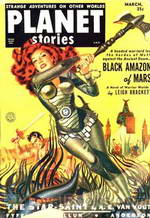 Duel on Syrtis
Duel on Syrtis
| |
By: President's Commission on the Accident at Three Mile Is | |
|---|---|
 Report of the President's Commission on the Accident at Three Mile Island
Report of the President's Commission on the Accident at Three Mile Island
At 4:00 a.m. on March 28, 1979, a serious accident occurred at the Three Mile Island 2 nuclear power plant near Middletown, Pennsylvania. The accident was initiated by mechanical malfunctions in the plant and made much worse by a combination of human errors in responding to it. During the next 4 days, the extent and gravity of the accident was unclear to the managers of the plant, to federal and state officials, and to the general public. What is quite clear is that its impact, nationally and internationally, has raised serious concerns about the safety of nuclear power. This Commission was established in response to those concerns. | |
By: Presidential Commission for the Study of Bioethical Iss | |
|---|---|
 Safeguarding children: pediatric medical countermeasure research
Safeguarding children: pediatric medical countermeasure research
Safeguarding Children: Pediatric Medical Countermeasure Research is the response from the Presidential Commission for the Study of Bioethical Issues to a request from Health and Human Services Secretary Kathleen Sebelius. In January 2012 Secretary Sebelius asked the Bioethics Commission to study the question of anthrax vaccine trials with children after receiving a recommendation from another federal committee that such research be initiated, pending ethical review. In this report the Bioethics Commission concluded that the federal government would have to take multiple steps before anthrax vaccine trials with children could be ethically considered... | |
By: Presidential Commission on the Space Shuttle Challenger | |
|---|---|
 Report to the President by the Presidential Commission on the Space Shuttle Challenger Accident
Report to the President by the Presidential Commission on the Space Shuttle Challenger Accident
Since being sworn in on February 6, 1986, the Commission has been able to conduct a comprehensive investigation of the Challenger accident. This report documents our findings and makes recommendations for your consideration. Our objective has been not only to prevent any recurrence of the failure related to this accident, but to the extent possible to reduce other risks in future flights. Each member of the Commission shared the pain and anguish the nation felt at the loss of the seven brave Americans in the Challenger accident on January 28, 1986... | |
By: Pye Henry Chavasse (1810-1879) | |
|---|---|
 Advice to a Mother on the Management of Her Children
Advice to a Mother on the Management of Her Children
| |
By: R. B. (Roscoe Burdette) Tobias (1880-) | |
|---|---|
 Women As Sex Vendors or, Why Women Are Conservative (Being a View of the Economic Status of Woman)
Women As Sex Vendors or, Why Women Are Conservative (Being a View of the Economic Status of Woman)
| |
By: R. C. FitzPatrick | |
|---|---|
 The Circuit Riders
The Circuit Riders
| |
By: R. Cadwallader Smith | |
|---|---|
 Within the Deep
Within the Deep
Presented in the form of lessons, R. Cadwallader Smith vividly portrays life in the ocean. Learn about the common and not so common that swim about in the deep, how they hunt for food and hide from enemies, visit a nursery and find out about the babies that live there, or take a stroll in an underwater garden. | |
By: R. D. (Reuben Dimond) Mussey (1780-1866) | |
|---|---|
 An Essay on the Influence of Tobacco upon Life and Health
An Essay on the Influence of Tobacco upon Life and Health
| |
By: R. G. (Roderick George) MacBeth (1858-1934) | |
|---|---|
 Policing the Plains Being the Real-Life Record of the Famous North-West Mounted Police
Policing the Plains Being the Real-Life Record of the Famous North-West Mounted Police
| |
By: R. M. (Ronald Macmillan) Algie (1888-1978) | |
|---|---|
 Report of the Juvenile Delinquency Committee
Report of the Juvenile Delinquency Committee
| |
By: R. R. Merliss | |
|---|---|
 The Stutterer
The Stutterer
| |
By: Rai Bahadur A. Mitra | |
|---|---|
 Bubonic Plague
Bubonic Plague
Dr. Rai Bahadur A. Mitra who was the Chief Medical Officer in Kashmir presents a short treatise on the bubonic plague. The book ranges from a short history of the bubonic plague, including an account of the great 1665 plague in London, through description of the disease, treatment and prevention. - Summary by Larry Wilson | |
By: Ralph Delahaye Paine (1871-1925) | |
|---|---|
 The Old Merchant Marine; A chronicle of American ships and sailors
The Old Merchant Marine; A chronicle of American ships and sailors
| |
By: Ralph Sholto | |
|---|---|
 The Clean and Wholesome Land
The Clean and Wholesome Land
| |
By: Ralph Williams (-1959) | |
|---|---|
 Cat and Mouse
Cat and Mouse
| |
By: Randall Garrett (1927-1987) | |
|---|---|
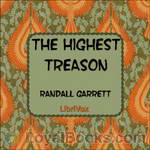 The Highest Treason
The Highest Treason
Set in a future in which humanity’s dream of total equality is fully realized and poverty in terms of material wealth has been eliminated, humanity has straight-jacketed itself into the only social system which could make this possible. Class differentiation is entirely horizontal rather than vertical and no matter what one’s chosen field, all advancement is based solely on seniority rather than ability. What is an intelligent and ambitious man to do when enslaved by a culture that forbids him from utilizing his God-given talents? If he’s a military officer in time of war, he might just decide to switch sides... | |
 A Spaceship Named McGuire
A Spaceship Named McGuire
Can a spaceship go crazy? Well, yes it can if it has a brain. And the new MG (magnetogravitic drive) experimental robot space ship does indeed have a 'brain'. Completely bewildered as to why the first six models of their supposedly perfect new ship model, the MG-YR, nicknamed the McGuire, have gone totally bonkers after activation and before they could ever be used, the company has called in the services of Daniel Oak. They suspect sabotage of course. Daniel Oak is the hard boiled private investigator with nerves of steel and a mind of the same substance... | |
 The Destroyers
The Destroyers
| |
 The Impossibles
The Impossibles
| |
 Unwise Child
Unwise Child
When a super-robot named Snookums discovers how to build his own superbombs, it becomes obvious that Earth is by no means the safest place for him to be. And so Dr. Fitzhugh, his designer, and Leda Crannon, a child psychologist acting as Snookums’ nursemaid, agree to set up Operation Brainchild, a plan to transport the robot to a far distant planet. But the space ship becomes the scene of some frightening events--the medical officer is murdered, and Snookums appears to be the culprit… | |
 ...After a Few Words...
...After a Few Words...
| |
 Psichopath
Psichopath
| |
 Belly Laugh
Belly Laugh
| |
 Fifty Per Cent Prophet
Fifty Per Cent Prophet
| |
 That Sweet Little Old Lady
That Sweet Little Old Lady
Randall Garrett had this story first published in Astounding Science Fiction September and October of 1959. His twisted sense of humor and gift for the bizarre situation with believable characters shines here. In the not too distant future, Ken Malone, young but promising FBI agent , is given the most important and difficult assignment of his career: find a spy who is stealing information from the Ultra Top Absolute Secret project to develop a non-rocket space ship at Yucca Flats Labs in Nevada. But this is not a normal spy, this spy laughs at the FBI and all attempts to find him or her because they use an unknown new method to steal the information directly from the minds of the scientists. | |
 The Bramble Bush
The Bramble Bush
| |
 Cum Grano Salis
Cum Grano Salis
| |
 Hail to the Chief
Hail to the Chief
| |
 Occasion for Disaster
Occasion for Disaster
| |
 ...Or Your Money Back
...Or Your Money Back
| |
 What The Left Hand Was Doing
What The Left Hand Was Doing
| |
 By Proxy
By Proxy
| |
 Suite Mentale
Suite Mentale
| |
 The Measure of a Man
The Measure of a Man
| |
 Dead Giveaway
Dead Giveaway
| |
 Hanging by a Thread
Hanging by a Thread
| |
 In Case of Fire
In Case of Fire
| |
 The Unnecessary Man
The Unnecessary Man
| |
 Heist Job on Thizar
Heist Job on Thizar
| |
 The Asses of Balaam
The Asses of Balaam
| |
 Anything You Can Do!
Anything You Can Do!
An alien crash lands on Earth, and for ten years terrorizes the planet, hiding, periodically killing and eating people and stealing materials for some unknown purpose. The only hope is Bart Stanton, a medically-engineered superman, designed for the sole purpose of confronting the “Nipe”. | |